Chapter 10. The Linguistics API¶
Topics
Linguistic Tools; Using the Spell Checker; Using the Thesaurus; Grammar Checking; Guessing the Language used in a String; Spell Checking and Grammar Checking a Document
Example folders: "Lingu Tests" and "Utils"
The linguistics API has four main components – a spell checker, a hyphenator, a thesaurus, and a grammar checker (which Office calls a proof reader). I'll look at how to program using the spell checker, thesaurus, and two grammar checkers, but I'll skip the hyphenator which is easier to use interactively through Office's GUI.
However, if you have an urge to hyphenate, then LingusticExamples.java in the Developer's Guide examples contains some code; it can be downloaded from https://api.libreoffice.org/examples/DevelopersGuide/OfficeDev/Linguistic/LinguisticExamples.java.
I'll describe two examples, Lingo.java and LingoFile.java. The first lists information about the linguistic services, then uses the spell checker, thesaurus, and grammar checker 'standalone' without having to load an Office document first. LingoFile.java automatically spell checks and grammar checks a complete file, reporting errors without altering the document.
One topic I'll be ignoring is how to create and edit the data files used by the linguistic services. For that task, you should have a look at PTG (Proofing Tool GUI) developed by Marco Pinto at https://marcoagpinto.cidadevirtual.pt/proofingtoolgui.html. It's an open source tool for editing Office's dictionary, thesaurus, hyphenation, and autocorrect files.
Another area I'll be skipping is the use of events and listeners. Please refer to the
"Linguistics" sub-section of chapter 6 of the Developer's Guide for details
(loGuide Linguistics). Listener code can be found in LinguisticExamples.java mentioned
above.
The linguistic features accessible through Office's GUI are explained in chapter 3 of the "Writer Guide", available at https://libreoffice.org/get-help/documentation, starting from the section called "Checking spelling and grammar".
An older information source is the "Lingucomponent Project" page at the OpenOffice website, https://openoffice.org/lingucomponent, which links to some useful tools, such as alternative grammar checkers. An interesting set of slides by Daniel Naber explaining the state of the project in 2005 can be found at https://danielnaber.de/publications/, along with more recent material.
1. The Linguistic Tools¶
Lingo.java prints a variety of information about the linguistics services:
public static void main(String args[])
{
Lo.loadOffice();
// print linguistics info
Write.dictsInfo();
XLinguProperties linguProps = Write.getLinguProperties();
Props.showProps("Linguistic Manager", linguProps);
Info.listExtensions();
// get lingo manager
XLinguServiceManager2 lingoMgr =
Lo.createInstanceMCF(XLinguServiceManager2.class,
"com.sun.star.linguistic2.LinguServiceManager");
if (lingoMgr == null) {
System.out.println("No linguistics manager found");
Lo.closeOffice();
return;
}
Write.printServicesInfo(lingoMgr);
: // code for using the services; see later
Lo.closeOffice();
} // end of main()
1.1. Dictionary Information¶
Write.dictsInfo() prints brief details about Office's dictionaries:
No. of dictionaries: 5
standard.dic (1); active; ""; positive
en-GB.dic (42); active; "GB"; positive
en-US.dic (42); active; "US"; positive
technical.dic (258); active; ""; positive
IgnoreAllList (0); active; ""; positive
No. of conversion dictionaries: 0
Each line includes the name of a dictionary, its number of entries, whether it's active (i.e. being used), its locale, and whether it's a positive, negative, or mixed dictionary.
A positive dictionary holds correctly spelled words only, while a negative one lists incorrectly spelt words. A mixed dictionary contains both correctly and incorrectly spelt entries.
If a dictionary has a locale, such as "GB" for en-GB.dic, then it's only utilized during spell checking if its locale matches Office's. The Office locale can be set via the Tools, Options, Language Settings, "Languages" dialog shown in Figure 1.
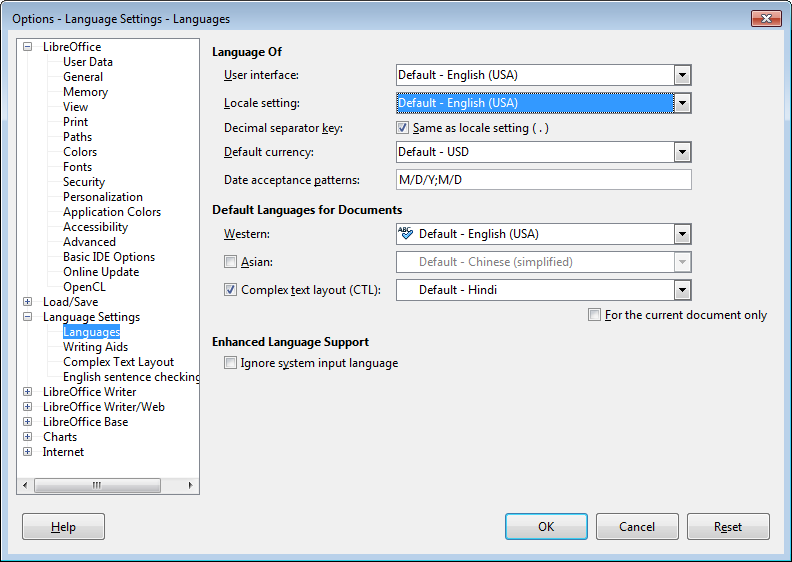
Figure 1. The Languages Dialog.
Figure 1 shows that my version of Office is using the American English locale, and so en-GB.dic won't be consulted when text is spell checked.
Write.dictsInfo() is defined as:
// in the Write class
public static void dictsInfo()
{
XSearchableDictionaryList dictList =
Lo.createInstanceMCF(XSearchableDictionaryList.class,
"com.sun.star.linguistic2.DictionaryList");
if (dictList == null)
System.out.println("No list of dictionaries found");
else
printDictsInfo(dictList);
XConversionDictionaryList cdList =
Lo.createInstanceMCF(XConversionDictionaryList.class,
"com.sun.star.linguistic2.ConversionDictionaryList");
if (cdList == null)
System.out.println("No list of conversion dictionaries found");
else
printConDictsInfo(cdList);
} // end of dictsInfo()
It retrieves a conventional dictionary list first (called dictList), and iterates through its dictionaries using printDictsInfo(). Then it obtains the conversion dictionary list (called csList), and iterates over that with printConDictsInfo().
Figure 2 shows the main services and interfaces used by ordinary dictionaries.
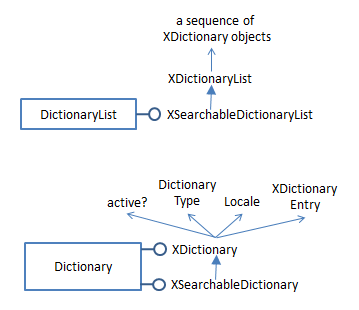
Figure 2. The DictionaryList and Dictionary Services.
Each dictionary in the list has an XDictionary interface which contains methods for accessing and changing its entries. printDictsInfo() retrieves an XDictionary array from the list, and prints out a summary of each dictionary:
// in the Write class
public static void printDictsInfo(
XSearchableDictionaryList dictList)
{ if (dictList == null) {
System.out.println("Dictionary list is null");
return;
}
System.out.println("No. of dictionaries: " +
dictList.getCount());
XDictionary[] dicts = dictList.getDictionaries();
for(XDictionary dict : dicts)
System.out.println(" " + dict.getName() +
" (" + dict.getCount() +
"); " + (dict.isActive() ? "active" : "na") +
"; \"" + dict.getLocale().Country +
"\"; " +
getDictType(dict.getDictionaryType()));
System.out.println();
} // end of printDictsInfo()
public static String getDictType(DictionaryType dt)
{
if (dt == DictionaryType.POSITIVE)
return "positive";
else if (dt == DictionaryType.NEGATIVE)
return "negative";
else if (dt == DictionaryType.MIXED)
return "mixed";
else
return "??";
} // end of getDictType()
Conversion dictionaries map words in one language/dialect to corresponding words in another language/dialect. 3 shows that conversion dictionaries are organized in a similar way to ordinary ones. The interfaces for manipulating a conversion dictionary are XConversionDictionary and XConversionPropertyType.
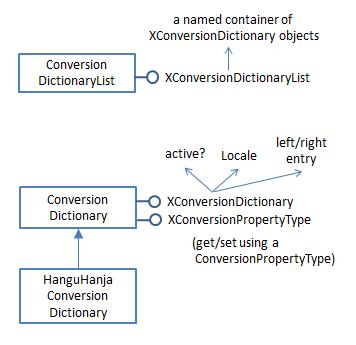
Figure 3. The ConversionDictionaryList and ConversionDictionary Services.
Write.dictsInfo() calls printConDictsInfo() to print the names of the conversion dictionaries – by extracting an XNameContainer from the dictionary list, and then pulling a list of the names from the container:
// in the Write clas
public static void printConDictsInfo(
XConversionDictionaryList cdList)
{ if (cdList == null) {
System.out.println("Conversion Dictionary list is null");
return;
}
XNameContainer dcCon = cdList.getDictionaryContainer();
String[] dcNames = dcCon.getElementNames();
System.out.println("No. of conversion dictionaries: " +
dcNames.length);
for(String dcName : dcNames)
System.out.println(" " + dcName);
System.out.println();
} // end of printConDictsInfo()
Output similar to Write.dictsInfo() can be viewed via Office's Tools, Options, Language Settings, "Writing Aids" dialog, shown in Figure 4.
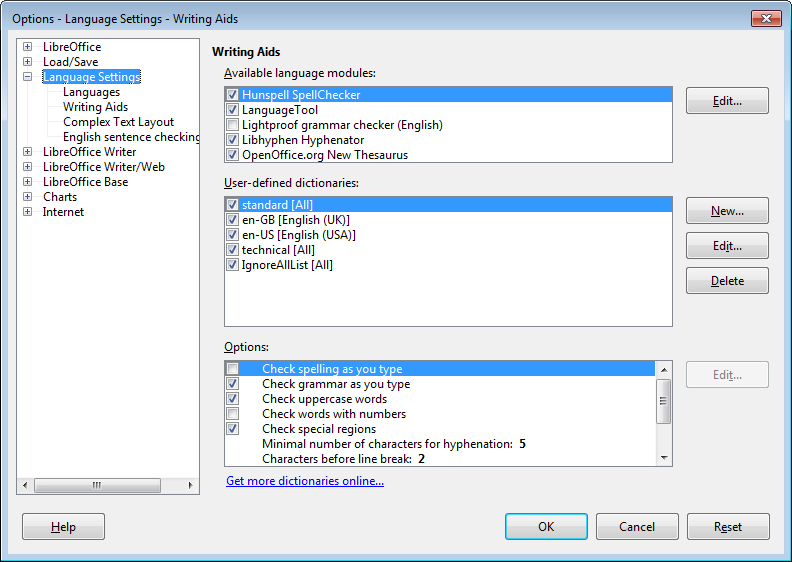
Figure 4. The Writing Aids Dialog.
The dictionaries are listed in the second pane of the dialog. Also, at the bottom of the window is a "Get more dictionaries online" hyperlink which takes the user to Office's extension website, and displays the "Dictionary" category (see Figure 5).
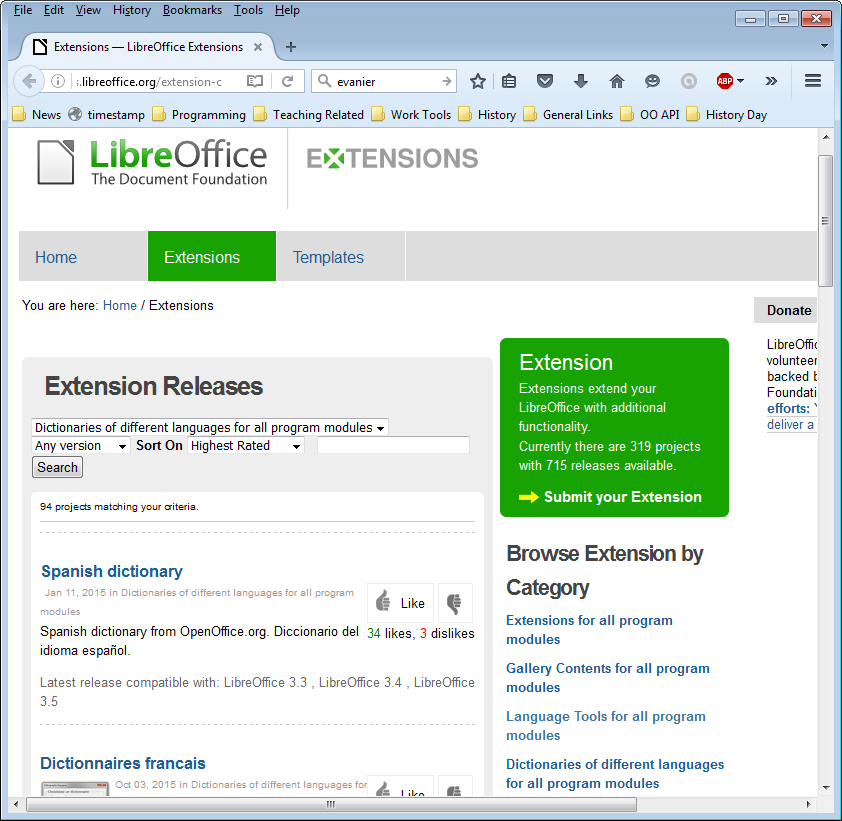
Figure 5. The Dictionary Extensions at the LibreOffice Website.
The URL of the page in Figure 5 is: https://extensions.libreoffice.org/extension-center?getCategories=Dictionary The dictionary category currently has 94 entries, but if you can't find what you're looking for, don't forget the extensions for OpenOffice, at: https://extensions.openoffice.org If you're unclear about how to install extensions, the process is explained online at https://wiki.documentfoundation.org/Documentation/HowTo/install_extension, or in the "Installing Extensions" guide available at https://libreoffice.org/get-help/documentation.
1.2. Linguistic Properties¶
Back in the Lingo.java example, Write.getLinguProperties() returns an instance of XLinguProperties, and its properties are printed by calling Props.showProps():
// in Lingo.java
XLinguProperties linguProps = Write.getLinguProperties();
Props.showProps("Linguistic Manager", linguProps);
The output:
Linguistic Manager Properties
DefaultLanguage == 0
DefaultLocale == com.sun.star.lang.Locale@1f95c5d
DefaultLocale_CJK == com.sun.star.lang.Locale@cd43c2
DefaultLocale_CTL == com.sun.star.lang.Locale@a8f0b4
HyphMinLeading == 2
HyphMinTrailing == 2
HyphMinWordLength == 5
IsGermanPreReform == Any[Type[void], null]
IsHyphAuto == false
IsHyphSpecial == true
IsIgnoreControlCharacters == true
IsSpellAuto == false
IsSpellCapitalization == true
IsSpellHide == Any[Type[void], null]
IsSpellInAllLanguages == Any[Type[void], null]
IsSpellSpecial == true
IsSpellUpperCase == true
IsSpellWithDigits == false
IsUseDictionaryList == true
IsWrapReverse == false
These properties are explained in the online documentation for the XLinguProperties
interface (lodoc XLinguProperties), and also in the Developer's Guide.
The properties are spread across several dialogs in Office's GUI, starting from the Tools, Options, "Language Settings" menu item. However, most of them are in the "Options" pane of the "Writing Aids" Dialog in Figure 4.
1.3. Installed Extensions¶
Additional dictionaries, and other language tools such as grammar checkers, are loaded into Office as extensions, so calling Info.listExtensions() can be informative.
The output on one of my test machine is:
Extensions:
1. ID: org.openoffice.en.hunspell.dictionaries
Version: 2011.12.05.1
Loc: file:///C:/Program%20Files/LibreOffice%205/program/
../share/extensions/dict-en
2. ID: French.linguistic.resources.from.Dicollecte.by.OlivierR
Version: 5.4.1
Loc: file:///C:/Program%20Files/LibreOffice%205/program/
../share/extensions/dict-fr
3. ID: org.openoffice.languagetool.oxt
Version: 3.4
Loc: file:///C:/Program%20Files/LibreOffice%205/program/
../share/uno_packages/cache/uno_packages/
lu4156ef34f.tmp_/LanguageTool-3.4.oxt
4. ID: com.sun.star.comp.Calc.NLPSolver
Version: 0.9
Loc: file:///C:/Program%20Files/LibreOffice%205/program/
../share/extensions/nlpsolver
5. ID: spanish.es_ANY.dicts.from.rla-es
Version: 0.8
Loc: file:///C:/Program%20Files/LibreOffice%205/program/
../share/extensions/dict-es
6. ID: com.sun.wiki-publisher
Version: 1.2.0
Loc: file:///C:/Program%20Files/LibreOffice%205/program/
../share/extensions/wiki-publisher
The "Loc" entries are the directories or OXT files containing the extensions. Most
extensions are placed in the
Office can display similar information via its Tools, "Extension Manager" dialog, as in Figure 6.
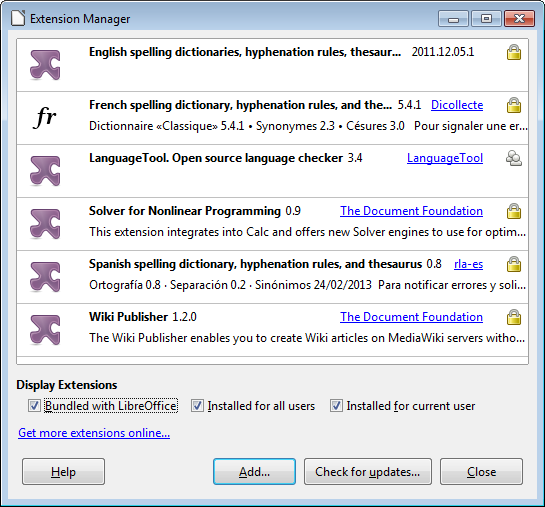
Figure 6. The Extension Manager Dialog.
The code for Info.listExtensions():
// in the Info class
public static void listExtensions()
{
XPackageInformationProvider pip = getPip();
if (pip == null)
System.out.println("No package info provider found");
else {
String[][] extsTable = pip.getExtensionList();
System.out.println("\nExtensions:");
String serviceName;
for(int i=0; i < extsTable.length; i++) {
System.out.println((i+1) + ". ID: " + extsTable[i][0]);
System.out.println(" Version: " + extsTable[i][1]);
System.out.println(" Loc: " +
pip.getPackageLocation(extsTable[i][0]));
System.out.println();
}
}
} // end of listExtensions()
public static XPackageInformationProvider getPip()
{ return PackageInformationProvider.get(Lo.getContext()); }
Extensions are accessed via the XPackageInformationProvider interface.
1.4. Examining the Lingu Services¶
The LinguServiceManager provides access to three of the four main linguistic services: the spell checker, the hyphenator, and thesaurus.The proof reader (i.e. the grammar checker) is managed by a separate Proofreader service, which I'll explain later.
Figure 7 shows the interfaces accessible from the LinguServiceManager service.
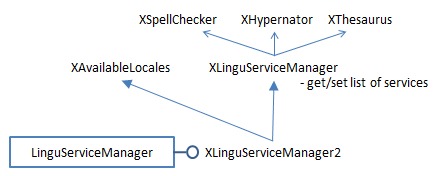
Figure 7. The LinguServiceManager Service and Interfaces.
In Lingo.java, the LinguServiceManager is instantiated and then Write.printServicesInfo() reports details about its services:
// in Lingo.java
:
// get lingo manager
XLinguServiceManager2 lingoMgr =
Lo.createInstanceMCF(XLinguServiceManager2.class,
"com.sun.star.linguistic2.LinguServiceManager");
if (lingoMgr == null) {
System.out.println("No linguistics manager found");
Lo.closeOffice();
return;
}
Write.printServicesInfo(lingoMgr);
Typical output from Write.printServicesInfo():
Available Services:
SpellChecker (1):
org.openoffice.lingu.MySpellSpellChecker
Thesaurus (1):
org.openoffice.lingu.new.Thesaurus
Hyphenator (1):
org.openoffice.lingu.LibHnjHyphenator
Proofreader (2):
org.languagetool.openoffice.Main
org.libreoffice.comp.pyuno.Lightproof.en
Configured Services:
SpellChecker (1):
org.openoffice.lingu.MySpellSpellChecker
Thesaurus (1):
org.openoffice.lingu.new.Thesaurus
Hyphenator (1):
org.openoffice.lingu.LibHnjHyphenator
Proofreader (1):
org.languagetool.openoffice.Main
Locales for SpellChecker (43):
AR AU BE BO BS BZ CA CA CH CL
CO CR CU DO EC ES FR GB GH GT
HN IE IN JM LU MC MW MX NA NI
NZ PA PE PH PR PY SV TT US UY
VE ZA ZW
Locales for Thesaurus (43):
AR AU BE BO BS BZ CA CA CH CL
CO CR CU DO EC ES FR GB GH GT
HN IE IN JM LU MC MW MX NA NI
NZ PA PE PH PR PY SV TT US UY
VE ZA ZW
Locales for Hyphenator (43):
AR AU BE BO BS BZ CA CA CH CL
CO CR CU DO EC ES FR GB GH GT
HN IE IN JM LU MC MW MX NA NI
NZ PA PE PH PR PY SV TT US UY
VE ZA ZW
Locales for Proofreader (94):
AF AO AR AT AU BE BE
BE BO BR BS BY BZ CA CA CD CH
CH CH CI CL CM CN CR CU DE DE
DK DO EC ES ES ES ES ES FI FR
FR GB GH GR GT HN HT IE IN IN
IN IR IS IT JM JP KH LI LT LU
LU MA MC ML MX MZ NA NI NL NZ
PA PE PH PH PL PR PT PY RE RO
RU SE SI SK SN SV TT UA US US
UY VE ZA ZW
The print-out contains three lists: a list of available services, a list of configured services (i.e. ones that are activated inside Office), and a list of the locales available to each service.
Figure 7 shows that LinguServiceManager only manages the spell checker, hyphenator, and thesaurus, and yet Write.printServicesInfo() includes information about the proof reader. Somewhat confusingly, although LinguServiceManager cannot instantiate a proof reader it can print information about it.
The output shows that two proofreader services are available (org.languagetool.openoffice.Main and org.libreoffice.comp.pyuno.Lightproof.en), but only one is configured (i.e. active). I'll explain this setup when I talk about the proof reader later.
The three lists are generated by Write.printServicesInfo() calling Write.printAvailServiceInfo(), Write.printConfigServiceInfo(), and Write.printLocales():
// in the Writer class
public static void printServicesInfo(
XLinguServiceManager2 lingoMgr)
{
com.sun.star.lang.Locale loc =
new com.sun.star.lang.Locale("en","US","");
// American English locale
System.out.println("Available Services:");
printAvailServiceInfo(lingoMgr, "SpellChecker", loc);
printAvailServiceInfo(lingoMgr, "Thesaurus", loc);
printAvailServiceInfo(lingoMgr, "Hyphenator", loc);
printAvailServiceInfo(lingoMgr, "Proofreader", loc);
System.out.println();
System.out.println("Configured Services:");
printConfigServiceInfo(lingoMgr, "SpellChecker", loc);
printConfigServiceInfo(lingoMgr, "Thesaurus", loc);
printConfigServiceInfo(lingoMgr, "Hyphenator", loc);
printConfigServiceInfo(lingoMgr, "Proofreader", loc);
System.out.println();
printLocales("SpellChecker", lingoMgr.getAvailableLocales(
"com.sun.star.linguistic2.SpellChecker"));
printLocales("Thesaurus", lingoMgr.getAvailableLocales(
"com.sun.star.linguistic2.Thesaurus"));
printLocales("Hyphenator", lingoMgr.getAvailableLocales(
"com.sun.star.linguistic2.Hyphenator"));
printLocales("Proofreader", lingoMgr.getAvailableLocales(
"com.sun.star.linguistic2.Proofreader"));
System.out.println();
} // end of printServicesInfo()
The choice of services depends on the current locale, so printServicesInfo() begins by creating an American English locale, which matches my version of Office.
Write.printAvailServiceInfo() utilizes XLinguServiceManager.getAvailableServices() to retrieve a list of the available services. In a similar way, Write.printConfigServiceInfo() calls XLinguServiceManager.getConfiguredServices(), and printLocales gets an array of Locale objects from XLinguServiceManager.getAvailableLocales().
2. Using the Spell Checker¶
There's a few examples in Lingo.java of applying the spell checker to individual words:
// in Lingo.java
XSpellChecker speller = lingoMgr.getSpellChecker();
Write.spellWord("horseback", speller);
Write.spellWord("ceurse", speller);
Write.spellWord("magisian", speller);
Write.spellWord("ellucidate", speller);
XLinguServiceManager.getSpellChecker() returns a reference to the spell checker, and Write.spellWord() checks the supplied word. For the code above, the following is printed:
* "ceurse" is unknown. Try:
No. of names: 8
"curse" "course" "secateurs" "cerise"
"surcease" "secure" "cease" "Ceausescu"
* "magisian" is unknown. Try:
No. of names: 7
"magician" "magnesia" "Malaysian" "mismanage"
"imagining" "mastication" "fumigation"
* "ellucidate" is unknown. Try:
No. of names: 7
"elucidate" "elucidation" "hallucinate" "pellucid"
"fluoridate" "elasticated" "illustrated"
Nothing is reported for "horseback" because that's correctly spelt, and spellWord() returns the boolean true.
The SpellChecker service and its important interfaces are shown in Figure 8.

Figure 8. The SpellChecker Service and Interfaces.
Write.spellWord() utilizes XSpellChecker.spell() to find a spelling mistake, then prints the alternative spellings:
// in the Write class
public static boolean spellWord(String word, XSpellChecker speller)
{
com.sun.star.lang.Locale loc =
new com.sun.star.lang.Locale("en", "US", "");
// American English
PropertyValue[] props = new PropertyValue[0];
XSpellAlternatives alts = speller.spell(word, loc, props);
if (alts != null) {
System.out.println("* \"" + word + "\" is unknown. Try:");
String[] altWords = alts.getAlternatives();
Lo.printNames(altWords);
return false;
}
else
return true;
} // end of spellWord()
XSpellChecker.spell() requires a locale and an array of properties, which I've left empty. The properties are those associated with XLinguProperties, which were listed above using Write.getLinguProperties(). Its output shows that "IsSpellCapitalization" is presently true, which means that words in all-caps will be checked. The property can be changed to false inside the PropertyValue array passed to XSpellChecker.spell(). For example:
PropertyValue[] props =
Props.makeProps("IsSpellCapitalization", false);
XSpellAlternatives alts = speller.spell(word, loc, props);
Now an incorrectly spelt word in all-caps, such as "CEURSE", will be skipped over.
This means that Write.spellWord("CEURSE", speller) should return true.
Unfortunately, XSpellChecker.spell() seems to ignore the property array, and still reports "CEURSE" as incorrectly spelt.
Even a property change performed through the XLinguProperties interface, such as:
XLinguProperties linguProps = Write.getLinguProperties();
Props.setProperty(linguProps, "IsSpellCapitalization", false);
fails to change XSpellChecker.spell()'s behavior. The only way to make a change to the linguistic properties that is acted upon is through the "Options" pane in the "Writing Aids" dialog, as in Figure 9.

Figure 9. Changing the Capitalization Property.
Office's default spell checker is Hunspell (from https://hunspell.github.io/), and has been part of OpenOffice since v.2, when it replaced MySpell, adding several features such as support for Unicode. The "MySpell" name lives on in a few places, such as in the spelling service (org.openoffice.lingu.MySpellSpellChecker).
Hunspell offers extra properties in addition to those in the "Options" pane of the "Writing Aids" dialog. They can be accessed through the Tools, Options, Language Settings, "English sentence checking" dialog shown in Figure 10.
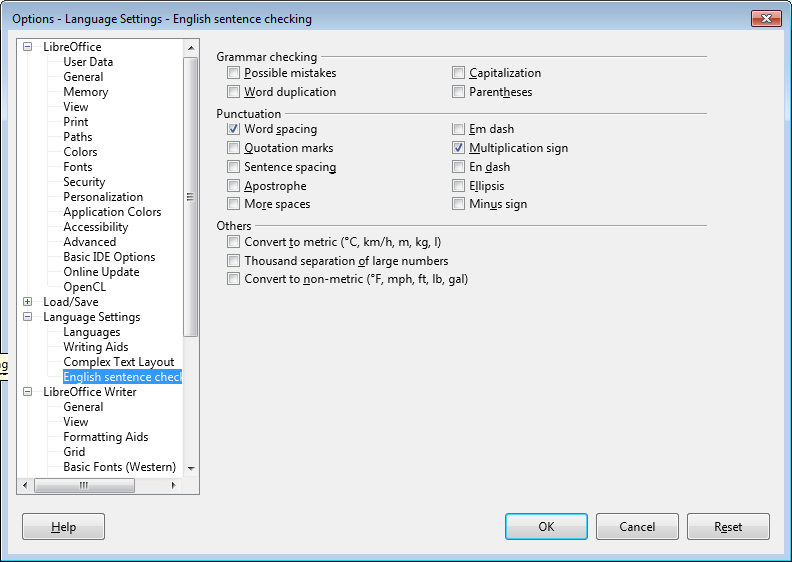
Figure 10. The English Sentence Checking Dialog.
The same dialog can also be reached through the Extension Manager window shown back in Figure 6. Click on the "English Spelling dictionaries" extension, and then press the "Options" button which appears as in Figure 11.

Figure 11. The English Spelling Options Button.
Unfortunately, there appears to be no API for accessing these Hunspell options. The best that can be done is to use a dispatch message to open the "English Sentence Checking" dialog in Figure 10. This done by calling Write.openSentCheckOptions():
GUI.setVisible(doc, true); // Office must be visible...
Lo.wait(2000);
Write.openSentCheckOptions(); // for the dialog to appear
Write.openSentCheckOptions() uses an ".uno:OptionsTreeDialog" dispatch along with an URL argument for the dialog's XML definition file:
// in the Writer class
public static void openSentCheckOptions()
// open "Options - Language Settings - English sentence checking
{
XPackageInformationProvider pip = Info.getPip();
String langExt = pip.getPackageLocation(
"org.openoffice.en.hunspell.dictionaries");
// System.out.println("Lang Ext: " + langExt);
String url = langExt + "/dialog/en.xdl";
PropertyValue[] props = Props.makeProps("OptionsPageURL", url);
Lo.dispatchCmd("OptionsTreeDialog", props);
Lo.wait(2000);
} // end of openSentCheckOptions()
The XML file's location is obtained in two steps. First the ID of the Hunspell service ("org.openoffice.en.hunspell.dictionaries") is passed to XPackageInformationProvider.getPackageLocation() to obtain the spell checker's installation folder. Figure 12 shows the directory on my machine.
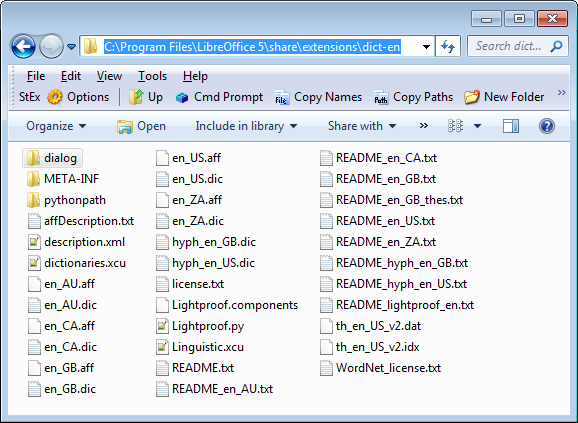
Figure 12. The Hunspell Installation Folder.
The directory contains a dialog subdirectory, which holds an XXX.xdl file that defines the dialog's XML structure and data. The "XXX" name will be Office's locale language, which in my case is "en".
The URL required by the "OptionsTreeDialog" dispatch is constructed by appending "/dialog/en.xdl" to the installation folder string.
3. Using the Thesaurus¶
Lingo.java contains two examples of how to use the thesaurus:
// in Lingo.java
:
XLinguServiceManager2 lingoMgr =
Lo.createInstanceMCF(XLinguServiceManager2.class,
"com.sun.star.linguistic2.LinguServiceManager");
:
XThesaurus thesaurus = lingoMgr.getThesaurus();
Write.printMeaning("magician", thesaurus);
Write.printMeaning("elucidate", thesaurus);
The output from the first call to Write.printMeaning() is:
"magician" found in thesaurus; number of meanings: 2
1. Meaning: (noun) prestidigitator
No. of synonyms: 6
prestidigitator
conjurer
conjuror
illusionist
performer (generic term)
performing artist (generic term)
2. Meaning: (noun) sorcerer
No. of synonyms: 6
sorcerer
wizard
necromancer
thaumaturge
thaumaturgist
occultist (generic term)
XLinguServiceManager2.getThesaurus() returns an instance of XThesaurus whose service and main interfaces are shown in Figure 13.
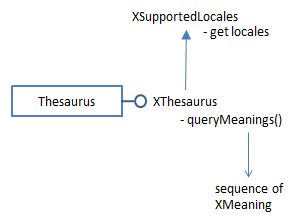
Figure 13. The Thesaurus Service and Interfaces.
Write.printMeaning() calls XThesaurus.queryMeanings(), and prints the array of results:
public static int printMeaning(String word, XThesaurus thesaurus)
{
com.sun.star.lang.Locale loc =
new com.sun.star.lang.Locale("en", "US", "");
// American English
PropertyValue[] props = new PropertyValue[0];
XMeaning[] meanings = thesaurus.queryMeanings(word, loc, props);
if (meanings == null) {
System.out.println("\"" + word +
"\" NOT found in thesaurus\n");
return 0;
}
else {
System.out.println("\"" + word + "\" found in thesaurus;
number of meanings: " + meanings.length);
for (int i=0; i < meanings.length; i++) {
System.out.println((i+1) + ". Meaning: " +
meanings[i].getMeaning());
String[] synonyms = meanings[i].querySynonyms();
System.out.println(" No. of synonyms: " + synonyms.length);
for (int k=0; k < synonyms.length; k++)
System.out.println(" " + synonyms[k]);
System.out.println();
}
return meanings.length;
}
} // end of printMeaning()
In a similar way to XSpellChecker.spell(), XThesaurus.queryMeanings() requires a locale and an optional array of properties. printMeaning() utilizes American English, and no properties.
If you need a non-English thesaurus which isn't part of Office, then look through the dictionary extensions at https://extensions.libreoffice.org/extension-center?getCategories=Dictionary; many include a thesaurus with the dictionary.
Thesaurus data is stored as ".idx" and ".dat" files in the same directory as the spell
checker (i.e. in
The files are built from WordNet data (https://wordnet.princeton.edu/), but use a text- based format explained very briefly in Daniel Naber's slides about the Lingucomponent Project (at https://danielnaber.de/publications/ooocon2005-lingucomponent.pdf). Also, the Lingucomponent website has some C++ code for reading ".idx" and '.dat" files (in https://openoffice.org/lingucomponent/MyThes-1.zip).
However, if you want to write code using a thesaurus independently of Office, then I'd suggest programming with one of the many APIs for WordNet; there are currently nine for Java, listed at https://wordnet.princeton.edu/wordnet/related-projects/#Java.
4. Grammar Checking¶
Office's default grammar checker (or proof reader) is Lightproof, a Python application
developed by László Németh. Lightproof.py, and its support files, are installed in the
same folder as the spell checker and thesaurus; on my machine that's
Older versions of Lightproof are available from OpenOffice's extensions website at https://extensions.services.openoffice.org/project/lightproof. One reason for downloading the old version is that it contains documentation on adding new grammar rules missing from the version installed in Office.
Another way to modify Lightproof's grammar rules is with its editor, which can be obtained from https://extensions.libreoffice.org/extension-center/lightproof-editor.
There are a number of alternative grammar checkers for Office, including "After the Deadline" (https://afterthedeadline.com/) and "LanguageTool" (https://languagetool.org/), which are easily added to Office as extensions via the "Language Tools" subsection of the website, at https://extensions.libreoffice.org/extension-center?getCategories=Language%20Tools.
When I first coded my examples, I used the default Lightproof for grammar checking, but it doesn't have a very extensive set of built-in grammar rules (it seems best at catching punctuation mistakes). I switched to LanguageTool because of its larger set of rules, and its support for many languages. I also like that it can be used as a standalone Java library, separate from Office, and that its site includes lots of documentation. Perhaps its biggest drawback is that it requires Java 8 or later.
Another issue is that LanguageTool and Lightproof cannot happily coexist inside Office. Lightproof must be disabled and LanguageTool enabled via the Options, Language Settings, Writing aids, "Available language modules" pane at the top of Figure 14.
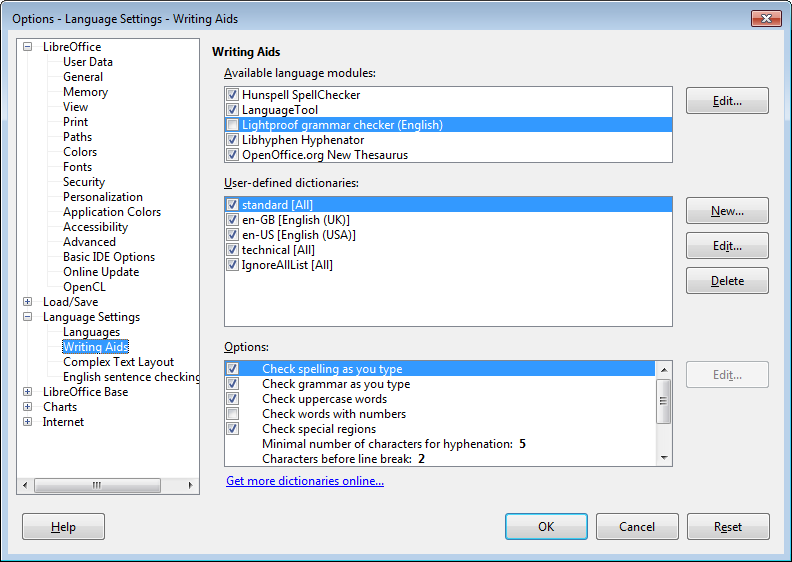
Figure 14. Goodbye Lightproof, hello LanguageTool.
I used Write.printServicesInfo() earlier to list the available and configured services.
The output included:
Available Services:
:
Proofreader (2):
org.languagetool.openoffice.Main
org.libreoffice.comp.pyuno.Lightproof.en
Configured Services:
:
Proofreader (1):
org.languagetool.openoffice.Main
"org.languagetool.openoffice.Main" refers to the LanguageTool extension, while "org.libreoffice.comp.pyuno.Lightproof.en" is the English version of Lightproof.
This information can be used to set the proof reader. LanguageTool is made the default by calling Write.setConfiguredServices() like so:
Write.setConfiguredServices(lingoMgr, "Proofreader",
"org.languagetool.openoffice.Main");
Alternatively, Lightproof can be enabled with:
Write.setConfiguredServices(lingoMgr, "Proofreader",
"org.libreoffice.comp.pyuno.Lightproof.en");
The code for Write.setConfiguredServices() is:
// in the Write class
public static void setConfiguredServices(
XLinguServiceManager2 lingoMgr,
String service, String implName)
{
com.sun.star.lang.Locale loc =
new com.sun.star.lang.Locale("en","US","");
String[] implNames = { implName };
lingoMgr.setConfiguredServices(
"com.sun.star.linguistic2." + service, loc, implNames);
} // end of setConfiguredServices()
The function utilizes XLinguServiceManager.setConfiguredServices() to attach a particular implementation service (e.g. LanguageTool) to a specified linguistic service (e.g. the Proofreader).
4.1. Error Reporting Options¶
The kinds of errors reported by the proof reader can be adjusted through Office's GUI.
One configuration pane, used by both Lightproof and LanguageTool, is in the "English Sentence Checking" dialog shown back in Figure 10. If you look closely, the first group of check boxes are titled "Grammar checking".
If you install LanguageTool, Office's Tools menu will be modified to contain a new "LanguageTool" submenu shown in Figure 15.
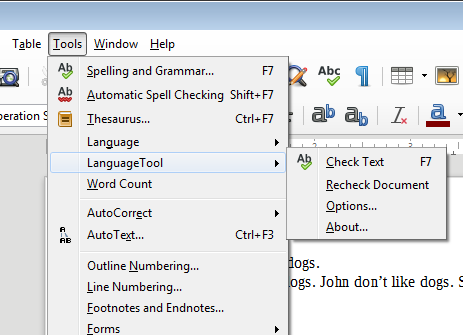
Figure 15. The LanguageTool Submenu.
The "Options" menu item in the "LanguageTool" submenu brings up an extensive set of options, reflecting the greater number of grammar rules in the checker (see Figure 16).
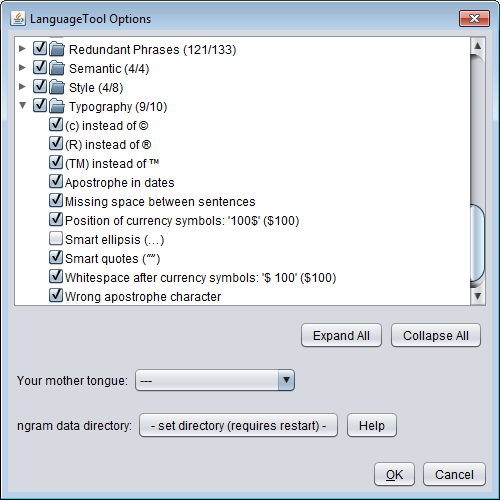
Figure 16. The LanguageTool Options Dialog.
Unfortunately, there seems to be no way to modify these options through Office's Proofreader API.
4.2. Using the Proof Reader¶
In Lingo.java the proof reader is loaded and called like so:
// in Lingo.java
:
XProofreader proofreader = Write.loadProofreader();
System.out.println("Proofing...");
int numErrs =
Write.proofSentence("i dont have one one dogs.", proofreader);
System.out.println("No. of proofing errors: " + numErrs + "\n");
The output is:
Proofing...
G* This sentence does not start with an uppercase letter in: "i"
Suggested change: "I"
G* Spelling mistake in: "dont"
Suggested change: "don't"
G* Word repetition in: "one one"
Suggested change: "one"
No. of proofing errors: 3
The proof reader isn't accessed through the linguistics manager; instead a Proofreader service is created, and its interfaces employed. A simplified view of the services and interfaces are shown in Figure 17.
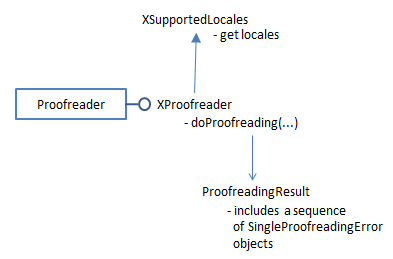
Figure 17. The Proofreader Service and Interfaces.
Write.loadProofreader() creates the service:
public static XProofreader loadProofreader()
{ return Lo.createInstanceMCF(XProofreader.class,
"com.sun.star.linguistic2.Proofreader"); }
Write.proofSentence() passes a sentence to XProofreader.doProofreading(), and prints the errors inside the returned ProofreadingResult instance:
public static int proofSentence(String sent,
XProofreader proofreader)
{ com.sun.star.lang.Locale loc =
new com.sun.star.lang.Locale("en", "US", "");
// American English
PropertyValue[] props = new PropertyValue[0];
int numErrs = 0;
ProofreadingResult prRes =
proofreader.doProofreading("1", sent, loc,
0, sent.length(), props);
if (prRes != null) {
SingleProofreadingError[] errs = prRes.aErrors;
if (errs.length > 0)
for(SingleProofreadingError err : errs) {
printProofError(sent, err);
numErrs++;
}
}
return numErrs;
} // end of proofSentence()
public static void printProofError(String str,
SingleProofreadingError err)
{ String errText = str.substring(err.nErrorStart,
err.nErrorStart + err.nErrorLength);
System.out.println("G* " + err.aShortComment +
" in: \"" + errText + "\"");
if (err.aSuggestions.length > 0)
System.out.println(" Suggested change: \"" +
err.aSuggestions[0] + "\"");
System.out.println();
} // end of printProofError()
XProofreader.doProofreading() requires a locale and properties array in the same way as the earlier spell checking and thesaurus methods. It also needs two indices for the start and end of the sentence being checked, and a document ID which is used in the error results.
The results are returned as an array of SingleProofreadingError objects, one for each
detected error. It's worth having a look at the documentation for the
SingleProofreadingError class (use lodoc SingleProofreadingError), since the
object contains more information than I've used in Write.printProofError(); for
example, the ID of the grammar rule that was 'broken', a full comment string, and
multiple suggestions in a String array.
Grammar rule IDs are one area where the proof reader API could be improved. The XProofreader interface includes methods for switching on and off rules based on their IDs, but there's no way to find out what these IDs are except by looking at SingleProofreadingError objects.
5. Guessing the Language used in a String¶
An oft overlooked linguistics API feature is the ability to guess the language used in a string, which is implemented by one service, LanguageGuessing, and a single interface, XLanguageGuessing. The documentation for XLanguageGuessing includes a long list of supported languages, including Irish Gaelic, Scots Gaelic, and Manx Gaelic.
There are two examples of language guessing in Lingo.java:
// in Lingo.java
:
Locale loc = Write.guessLocale(
"The rain in Spain stays mainly on the plain.");
Write.printLocale(loc);
if (loc != null)
System.out.println("Guessed language: " + loc.Language);
loc = Write.guessLocale(
"A vaincre sans péril, on triomphe sans gloire.");
// To win without risk is a triumph without glory.
if (loc != null)
System.out.println("Guessed language: " + loc.Language);
The output is:
Locale lang: "English"; country: ""; variant: ""
Guessed language: en
Guessed language: fr
Write.guessLocale() creates the service, its interface, and calls XLanguageGuessing.guessPrimaryLanguage():
// in the Writer class
public static com.sun.star.lang.Locale guessLocale(String testStr)
{
XLanguageGuessing guesser =
Lo.createInstanceMCF(XLanguageGuessing.class,
"com.sun.star.linguistic2.LanguageGuessing");
if (guesser == null) {
System.out.println("No language guesser found");
return null;
}
else
return guesser.guessPrimaryLanguage(testStr,
0, testStr.length());
} // end of guessLocale()
XLanguageGuessing actually guesses a locale rather than a language, and the locale includes information about the language, country and a variant BCP 47 language label. com.sun.star.lang.Locale stores that information as three strings, but XLocale has additional methods for displaying the string codes in longer formats (e.g. "th" as "Thailand"). Unfortunately, I was unable to get code using XLocale to compile, so fell back to Java's Locale class which includes similar methods.
Write.printLocale() converts an Office locale into a Java version, then prints its data in long form:
public static void printLocale(com.sun.star.lang.Locale loc)
{
if (loc != null) {
java.util.Locale jloc =
new java.util.Locale(loc.Language, loc.Country, loc.Variant);
System.out.println("Locale lang: \"" +
jloc.getDisplayLanguage() +
"\"; country: \"" + jloc.getDisplayCountry() +
"\"; variant: \"" + jloc.getDisplayVariant() + "\"");
}
} // end of printLocale()
6. Spell Checking and Grammar Checking a Document¶
Lingo.java only spell checks individual words, and grammar checks a single sentence.
The LingoFile.java example shows how these features can be applied to an entire document.
One way to scan every sentence in a document is to combine XParagraphCursor and XSentenceCursor, as in the TalkingBook.java example from Chapter 5, section 6. An outer loop iterates over every paragraph using XParagraphCursor, and an inner loop splits each paragraph into sentences with the help of XSentenceCursor. Initially, I coded LingoFile.java in this way, but found that XSentenceCursor occasionally didn't divide a paragraph into the correct number of sentences; sometimes two sentences were treated as one.
So I switched to a combined Office/Java approach – the outer loop in LingoFile.java still utilizes XParagraphCursor to scan the paragraphs, but the sentences in a paragraph are extracted using a sentence-based BreakIterator.
The main() function of LingoFile.java:
public static void main(String args[])
{
if (args.length < 1) {
System.out.println("Usage: run LingoFile <fnm>");
return;
}
XComponentLoader loader = Lo.loadOffice();
XTextDocument doc = Write.openDoc(args[0], loader);
if (doc == null) {
System.out.println("Could not open " + args[0]);
Lo.closeOffice();
return;
}
// load spell checker, proof reader
XSpellChecker speller = Write.loadSpellChecker();
XProofreader proofreader = Write.loadProofreader();
BreakIterator bi = BreakIterator.getSentenceInstance(
java.util.Locale.US);
// iterate through the doc by paragraphs
XParagraphCursor paraCursor = Write.getParagraphCursor(doc);
paraCursor.gotoStart(false); // go to start of text
String currPara;
do {
paraCursor.gotoEndOfParagraph(true);
// select all of paragraph
currPara = paraCursor.getString();
if (currPara.length() > 0)
checkSentences(currPara, bi, speller, proofreader);
} while (paraCursor.gotoNextParagraph(false));
Lo.closeDoc(doc);
Lo.closeOffice();
} // end of main()
Write.loadSpellChecker() hides the creation of the linguistics manager, and its retrieval of the spell checker:
// in the Write class
public static XSpellChecker loadSpellChecker()
{
XLinguServiceManager lingoMgr =
Lo.createInstanceMCF(XLinguServiceManager.class,
"com.sun.star.linguistic2.LinguServiceManager");
if (lingoMgr == null) {
System.out.println("No linguistics manager found");
return null;
}
else
return lingoMgr.getSpellChecker();
} // end of loadSpellChecker()
The BreakIterator is instantiated in main() using:
BreakIterator bi =
BreakIterator.getSentenceInstance(java.util.Locale.US);
but employed inside checkSentences(), which splits a paragraph into sentences:
// in LingoFile.java
private static void checkSentences(String currPara,
BreakIterator bi,
XSpellChecker speller, XProofreader proofreader)
{
System.out.println("\n>> " + currPara);
bi.setText(currPara);
int lastIdx = bi.first();
while (lastIdx != BreakIterator.DONE) {
int firstIdx = lastIdx;
lastIdx = bi.next();
if (lastIdx != BreakIterator.DONE) {
String sentence = currPara.substring(firstIdx, lastIdx);
Write.proofSentence(sentence, proofreader);
Write.spellSentence(sentence, speller);
}
}
} // end of checkSentences()
The index positions of the start of the current sentence and the start of the next sentence are stored in firstIdx and lastIdx, and used to extract a substring spanning the current sentence. This is passed to Write.spellSentence() and Write.proofSentence() for spell and proof checking. Write.spellSentence() splits the sentence into an array of words, and calls Write.spellWord() on each one:
// in the Write class
public static int spellSentence(String sent, XSpellChecker speller)
{
String[] words = sent.split("\\W+"); // split into words
int count = 0;
boolean isCorrect;
for(String word : words) {
isCorrect = spellWord(word, speller);
count = count + (isCorrect? 0 : 1);
}
return count;
} // end of spellSentence()
The poorly written "badGrammar.odt" is shown in Figure 18.

Figure 18. Not a Good Example of my Writing Skills.
The output from LingoFile.java when given "badGrammar.odt":
>> I have a dogs. I have one dogs.
G* Possible agreement error in: "a dogs"
Suggested change: "a dog"
>> I allow of of go home. i dogs. John don’t like dogs. So recieve
no cats also.
G* Word repetition in: "of of"
Suggested change: "of"
G* This sentence does not start with an uppercase letter in: "i"
Suggested change: "I"
G* Grammatical problem in: "dogs"
Suggested change: "dog"
G* 'Also' at the end of sentence in: "also"
Suggested change: "as well"
* "recieve" is unknown. Try:
No. of names: 8
"receive" "relieve" "retrieve" "reprieve"
"reverie" "recitative" "Recife" "reserve"
The grammar errors (those starting with "G*") are produced by the LanguageTool
proof checker. If the default Lightproof checker is utilized instead, then less errors are
found:
>> I have a dogs. I have one dogs.
>> I allow of of go home. i dogs. John don’t like dogs. So recieve
no cats also.
G* Word duplication? in: "of of"
Suggested change: "of"
G* Missing capitalization? in: "i"
Suggested change: "I"
* "recieve" is unknown. Try:
No. of names: 8
"receive" "relieve" "retrieve" "reprieve"
"reverie" "recitative" "Recife" "reserve"
On larger documents, such as the Sherlock Holmes short story in "bigStory.doc", it's a good idea to redirect the voluminous output to a temporary file so it can be examined easily.
More than half the errors for "bigStory.doc" are spurious reports of unpaired quotes.
The output can be considerably reduced if LanguageTool's unpaired rule is disabled, via the Options dialog in Figure 16. Figure 19 shows the dialog with the "Unpaired" checkbox deselected in the Punctuation section.

Figure 19. The LanguageTool Options Dialog with the Unpaired Rule Deselected.
The majority of the remaining errors are words unknown to the spell checker, such as names and places, and British English spellings.
Most of the grammar errors relate to how direct speech is written. The grammar checker mistakenly reports an error if the direct speech ends with a question mark or exclamation mark without a comma after the quoted text.
On balance, I'd say that Sir Arthur Conan Doyle was an excellent speller and grammarian, or his copy editor was.